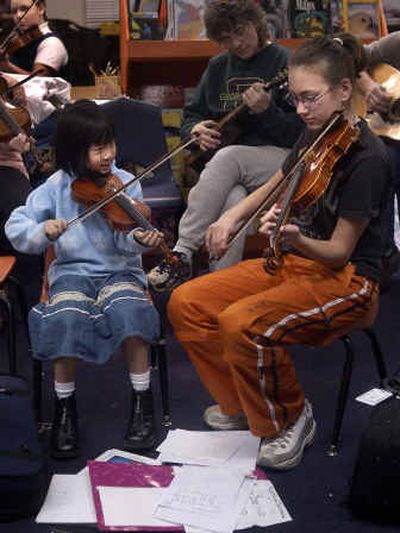Music time

A crowded orchestra of child fiddlers saws out old-timey tunes, some working their tiny bows as artfully as if guiding a needle and thread, others cutting away like wild lumbermen. Their sounds fill the front classroom of Spokane Valley’s Pioneer School and pour into the parking lot as more musicians filter in late. An older man strumming a guitar smiles big at every latecomer.
“Just jump in there, son,” Frank Wagner tells a 6-year-old boy who is walking into the room with a fiddle case that is almost the size of his little sister, who trails behind. “Welcome,” Wagner says. Welcome to a fiddle class where attendance is free, reading music is optional and every child leaves her first lesson knowing at least one song.
It’s an every-Tuesday gathering, modestly named Music Workshop, which has produced a handful of champion fiddlers and several working musicians since Wagner created it 31 years ago. Wagner, a 64-year-old Lewiston native, started the class in the 1970s because he sensed that old-time music was fading in the face of rock and roll.
All that’s asked of attendees is that once they learn a song, they teach it to someone else. And, that parents stay and watch or stay and play. Music Workshop isn’t a day care, Wagner tells a woman who is walking out the door almost before her children walk in; it’s an opportunity to bring families together through music.
There are parents who are former students leaning against the walls of this tiny classroom watching the 20 or so children play. Nick Castilla, who has brought a foster child to Music Workshop for a first lesson, grew up playing along with Wagner on Tuesday nights. Like most kids, he was quickly playing songs proficiently.
“I came in and just started doing it,” Castilla said. “I just learned from Frank and started practicing on my own.” When Castilla came to learn, Music Workshop wasn’t at Pioneer School. The program isn’t affiliated with any education program, public or private, and has moved around quite a bit in its three decades. Several years ago, Music Workshop used to meet at North Pines Junior High. The school’s janitors were less than enthusiastic about having a group of fiddling kids in the building every Tuesday night, though some of those kids went on be great musicians.
A little girl named Jay Dean Ludiker attended Wagner’s early classes, which at the time were held at Garry Junior High. She sawed away at the same music Wagner’s students play today, tunes like “Boil The Cabbage Down,” “Soldier’s Joy” and “Jesus Loves Me.” She won the national ladies crown in 1982, awarded by the Old-Time Fiddlers.
Ludiker also married one of her Music Workshop classmates, Tony Ludiker. Though the couple later divorced, their love of music didn’t die. Today, Wagner’s students use a book of music published by Jay Dean Ludiker. It’s a book that gets students started by learning to hold the right string with the right finger while stroking the fiddle with a bow for the right number of times. All the instructions are conveyed by numbers on a page instead of notes. The actual sheet music appears on the opposite page, so students can eventually make the transition to reading notes.
At the beginning of every class, Wagner advises the children to be nice to one another, because they never know who their future sweethearts will be. He passes around a signup list so he knows who was in class on a certain night, which allows him to call around later if someone leaves a mitten or a coat behind. It’s also nice, he tells the children, to look back at the notebooks after 20 years and remember who he was playing with.
“Seven couples got married out of this workshop,” Wagner tells the kids. “So, you better be good to each other because you never know.”
Not all of his students are children. Diane Hanson is a classically trained concert violinist who came to Wagner’s workshop on the urging of some friends who play Celtic music. Her friends all learned how to play music by ear and thought performing with Hanson would be simpler if she weren’t hung up on the lack of sheet music.
Learning to play by ear was just a different way to play, Hanson says, one that required her to listen for the right notes instead of finding them on the page. In a way, it was a lot like walking through a familiar room with the lights off; it was easy once she relied on her sense of sound and touch instead of her eyes. She prefers to play by ear today.
“I had to get over my self-doubt, to start thinking I could do it,” Hanson said.
And believing you can play is just as important as understanding the notes and mechanics of music, Wagner said. After all, people take up the fiddle because they want to play music, so why not teach them a song first and sweat the details later. A few songs down the road, the notes and mechanics start making sense.
“I don’t care if you use your left ear lobe (to play) as long as it sounds good,” Wagner says.
As long as it sounds good and you teach someone else how to play, that is.